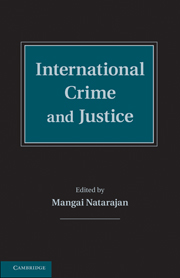Book contents
- Frontmatter
- Contents
- List of Figures
- List of Tables
- List of Contributors
- Foreword
- Preface
- Introduction
- Part I International Criminology
- Part II Law, Punishment, and Crime Control Philosophies of the World
- Part III Transnational Crime
- Part IV Organized Crime and Terrorism
- Part V International crime
- 39 Genocide, War Crimes, and Crimes against Humanity
- 40 History of Genocide
- 41 Apartheid
- 42 War Crimes
- 43 The Crime of Aggression
- Part VI Delivering International Justice
- Part VII International Cooperation and Criminal Justice
- Part VIII International Research and Crime Statistics
- Part IX International research resources
- World Map
- Index
- References
43 - The Crime of Aggression
Published online by Cambridge University Press: 05 October 2014
- Frontmatter
- Contents
- List of Figures
- List of Tables
- List of Contributors
- Foreword
- Preface
- Introduction
- Part I International Criminology
- Part II Law, Punishment, and Crime Control Philosophies of the World
- Part III Transnational Crime
- Part IV Organized Crime and Terrorism
- Part V International crime
- 39 Genocide, War Crimes, and Crimes against Humanity
- 40 History of Genocide
- 41 Apartheid
- 42 War Crimes
- 43 The Crime of Aggression
- Part VI Delivering International Justice
- Part VII International Cooperation and Criminal Justice
- Part VIII International Research and Crime Statistics
- Part IX International research resources
- World Map
- Index
- References
Summary
INTRODUCTION
The crime of aggression, or crime against peace, has been famously labeled as the “supreme international crime” by Robert H. Jackson, the Chief American Prosecutor at the Nuremberg trials. Of the twenty-two former Nazi leaders tried in Nuremberg, twelve were convicted for crimes against peace. The International Military Tribunal for the Far East (the “Tokyo Tribunal”) had an even stronger focus on aggression. It prosecuted only those military and political leaders whose crimes included aggression. Twenty-four of them were convicted of this crime.
The crime of aggression is, in essence, the crime of waging an illegal war, in order words, a war in contravention of the United Nations Charter. It is, thus, the criminal law corollary to state responsibility for the most serious cases of illegal use of armed force. The Charter prohibits the threat or use of force except in the case of self-defense or when authorized by the Security Council. But while there have been many instances of such illegal use of force since the founding of the United Nations, no international (or domestic) trials for a crime of aggression have been conducted during the last six decades. This is due to two basic reasons: a longstanding controversy over a legally binding definition of aggression, and the lack of an international court effectively empowered to prosecute aggression. Both of these issues, however, have recently been resolved for the purpose of the Rome Statute of the International Criminal Court (ICC): In June 2010, a Review Conference held in Kampala, Uganda, adopted amendments to the Rome Statute on the crime of aggression by a consensus decision. The amendments contain a legally binding definition of the crime and the precise conditions under which the ICC will be empowered to prosecute those responsible for crimes of aggression committed no earlier than 2017. Already prior to the Review Conference, it was generally accepted that the crime of aggression was indeed an existing crime under international law. In 2006, this view was confirmed by the British House of Lords. Furthermore, some two dozen countries worldwide (including Germany and the Russian Federation) have incorporated the crime of aggression into their domestic criminal codes.
- Type
- Chapter
- Information
- International Crime and Justice , pp. 329 - 334Publisher: Cambridge University PressPrint publication year: 2010
References
- 2
- Cited by



